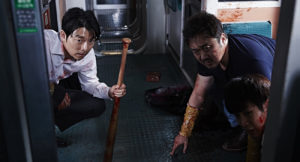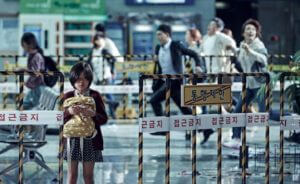Review: Train to Busan (부산행, 2016) ★★½
South Korea has become a powerhouse in the horror and horror-thriller genre over the last decade and a half. There have been many examples of their superb filmmaking combined with adequately horrific and disturbing story-telling: Kim Jee-woon’s A Tale of Two Sisters (2003) and I Saw the Devil (2010), Bong Joon-ho’s The Host (2006), and Park Chan-wook’s Oldboy (2003) and Thirst (2009), among others. In all of these films, there is a building of tension, almost at a snail’s pace, intermittently broken up by frightening images or revelations, and it works. These kinds of films keep the audience on the edge of their seats, and never suffer from being overly formulaic or reminiscent of Hollywood’s take on the horror genre. They feel unique to the Korean style of filmmaking and viewership. Unfortunately, Yeon Sang-ho’s Train to Busan does not fit into this mold. It takes an entirely different, altogether less interesting approach.
The premise is intriguing, though not entirely original. A speeding train is a popular setting for horror/action films, due to its being inherently claustrophobic and at the same time allowing for a high-octane thrill ride. Films such as The Midnight Meat Train (2008) and Howl (2015) have used trains as the setting for their carnage with varying degrees of success, and this actually works pretty well in Train to Busan. A zombie epidemic shown from the perspective of train passengers as they barrel through the apocalyptic setting is both scary and exciting.
At the start of the film, we are introduced to Seok-woo, a career oriented fund manager who struggles to balance his work and family life. Seok-woo is not on good terms with his ex-wife, and his daughter, Soo-an, is slowly pulling away from him due to his selfishness and workaholic lifestyle. When Soo-an insists on taking the train to Busan to see her mother, her father is reluctant, but eventually agrees to take her. As they board the train, news breaks across the country of a horrific and fast-spreading virus that is turning the populace into bloodthirsty zombies. Just before the doors close, an infected woman slips past the attendant and stumbles onto the train. The passengers are suddenly trapped with an ever-growing number of infected, and must find a way to reach their destination safely.

Many of the scenes in Train to Busan are reminiscent of Snowpiercer (2013), a far superior film from South Korean director, Bong Joon-ho. Our heroes fight their way down a long string of cable cars, with each new segment of the train presenting a slightly different challenge than the last. Though they are entertaining, these extended fight sequences, interspersed with moments of sugary-sweet sentimentality, serve as the vast majority of the film’s plot. At times, Train to Busan becomes much more of a formulaic action movie than a horror movie, and this is possibly its greatest fault. Rather than having interesting characters, facing a terrifying situation, these are merely tired archetypes of people engaging in over-the-top fight sequences with the undead.
Seok-woo is the workaholic father, who must become less selfish and realize that family is the most important thing in his life, so that he may truly love and appreciate his daughter. Soo-an is the typical action-movie daughter, a doe-eyed, inquisitive little girl with an unfaltering moral compass. Then there is Sang-hwa, who initially comes across as abrasive and vulgar, but we come to realize that he is a kind-hearted working class man, who just wants what is best for his pregnant wife, Seong-kyeong. A few less important archetypes are also scattered about the train: a shy young man who must embrace his masculinity to try to save his girlfriend, a rich CEO whose selfishness borders on pure evil, a homeless man who teaches us that you can’t judge a book by its cover, and so on. The character types are such that, once the general premise is set and everyone is in place, we can predict what each of the main characters will inevitably do.
In addition to the predictability of the plot and characters, the film also beats us over the head with its lame sense of right and wrong. You shouldn’t judge people based on their appearance; money is not the most important thing in the world; spend time with your family while you still have the chance; be willing to make sacrifices for your loved ones; karma will punish those who are selfish; deep-down, the rich and the poor are the same, etc. It borders on being insulting at times, and ruins what could have been a fantastic zombie film.

So, Train to Busan has a great premise that is held back by cookie-cutter characters and an overly sentimental moral compass. These last two elements would be forgivable if not for the sheer length of the film. At 118 minutes long, Train to Busan feels like it will never end. What should have been an hour and a half movie is stretched for an extra thirty minutes for no reason in particular. Much like other formulaic action movies, the characters are faced with new and increasingly implausible hurdles to overcome, with each hurdle extending the story unnecessarily. You will be begging them to wrap it up after the 90-minute mark.
In short, Train to Busan took what could have been an amazing horror film and ran it off the rails with lazy, predictable writing and far too much screen time.
Rating: ★★½ out of 5
If you’d like to watch Train to Busan, it is currently available to rent or purchase via Amazon here.

